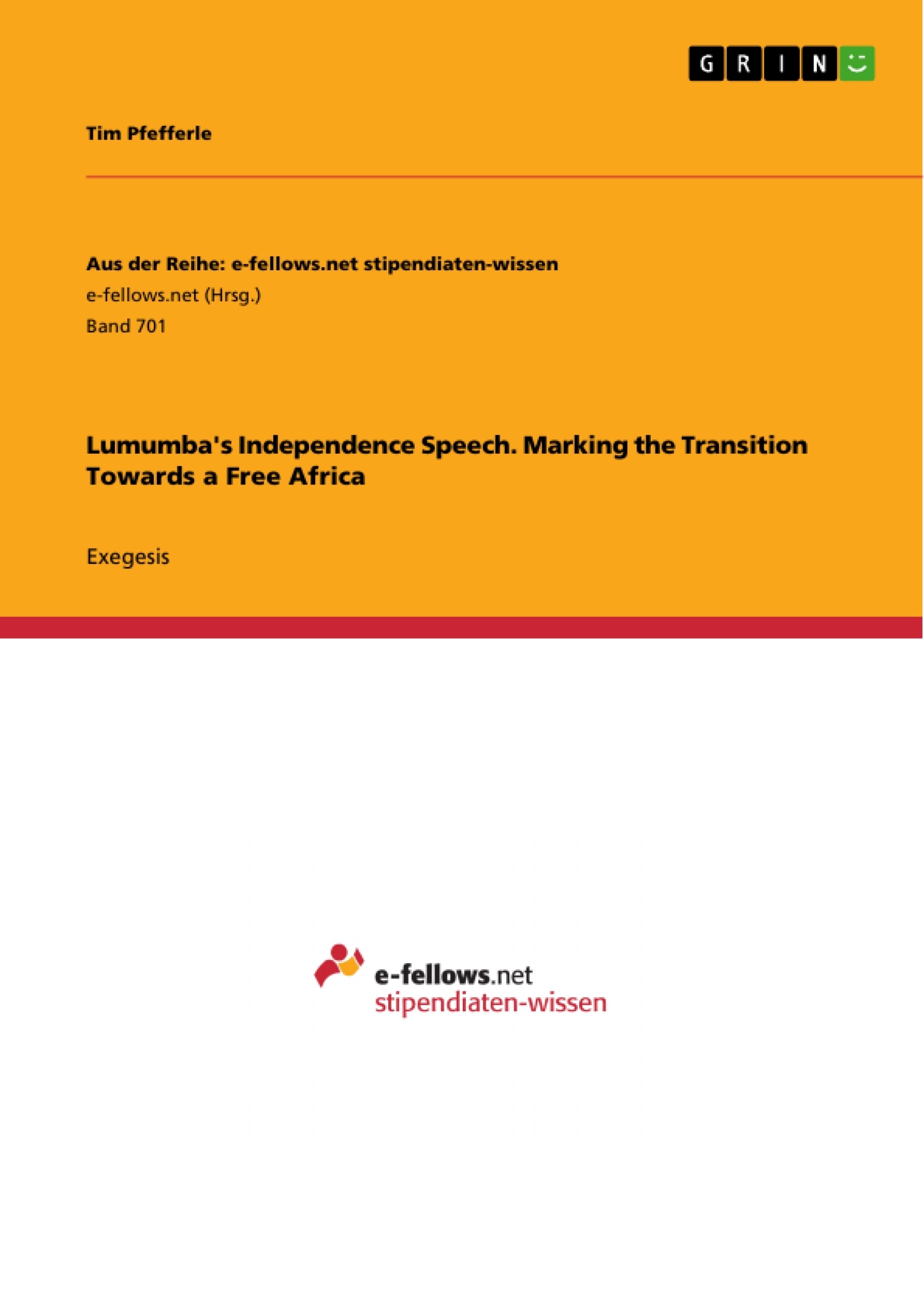An exegesis of Patrice Lumumba's speech on Congolese Independence Day on June 30, 1960. It will deal with aspects of struggle, national cohesion and liberty contained in Lumumba's vision of a new Congo.
Table of Contents
- Summary
- Introduction
- Context
- Formal Analysis
- Themes
- Struggle
- National Cohesion
- Liberty
Objectives and Key Themes
The objective of this exegesis is to analyze Patrice Lumumba's Independence Day speech, delivered on June 30th, 1960, within the context of the Congolese struggle for independence and its ongoing relevance to the Democratic Republic of Congo (DRC). The analysis explores the speech's structure, language, and themes to understand its impact and lasting significance.
- The struggle for independence and the condemnation of Belgian colonialism.
- The importance of national cohesion in building a unified and independent Congo.
- Lumumba's vision of liberty and its multifaceted dimensions (political, economic, social).
- The strategic use of language to appeal to both domestic and international audiences.
- The lasting relevance of Lumumba's message to contemporary challenges in the DRC.
Chapter Summaries
Summary: This section provides a concise overview of Lumumba's Independence Day speech, highlighting its unexpected nature, its condemnation of colonialism, and Lumumba's vision for an independent Congo encompassing economic, political, and social aspects. The summary also mentions Lumumba's appeal for national support and his assurance of cooperation with the international community.
Introduction: This chapter sets the stage by referencing the ongoing conflict in the eastern DRC and the enduring search for national identity. It positions Lumumba's 1960 speech as a potential "tipping point" in Congolese history, highlighting its relevance to the country's current challenges and the themes of national identity, independence, and liberty.
Context: This section delves into the historical context of Lumumba's speech, tracing the Congolese struggle for independence from Belgian colonial rule. It profiles Lumumba's trajectory, from his early involvement in the colonial system to his growing antagonism towards it and his eventual emergence as a leader of the independence movement. The chapter also details the political landscape of the Congo leading up to independence, including the formation of various political parties and the eventual scheduling of elections.
Formal Analysis: This chapter provides a detailed analysis of the structure and language of Lumumba's speech. It notes the division of the speech into two parts: the first denouncing Belgian colonialism and the second outlining a vision for the future. The analysis examines Lumumba's use of military terminology, rhetorical questions, and anaphora to emphasize the struggle for independence and the injustices of colonial rule. The chapter also explores how Lumumba adapted his language and tone to address both domestic and international audiences, highlighting the inherent complexities and contradictions within his message.
Themes: This section explores the three dominant themes in Lumumba's speech: struggle, national cohesion, and liberty. Each theme is analyzed in detail, providing examples from the speech and exploring their significance within the context of Congolese independence and nation-building. The analysis also examines how Lumumba weaves these themes together to create a powerful and persuasive message.
Keywords
Patrice Lumumba, Congolese independence, Belgian colonialism, postcolonialism, national identity, national cohesion, liberty, struggle, Pan-Africanism, decolonization, political speech analysis.
Frequently Asked Questions: Patrice Lumumba's Independence Day Speech
What is this document?
This document is a comprehensive language preview of an analysis of Patrice Lumumba's Independence Day speech delivered on June 30th, 1960. It includes a table of contents, objectives and key themes, chapter summaries, and keywords. The analysis focuses on the themes of struggle, national cohesion, and liberty within the context of Congolese independence and its ongoing relevance to the Democratic Republic of Congo (DRC).
What are the main objectives of the analysis?
The analysis aims to explore the speech's structure, language, and themes to understand its impact and lasting significance. Specifically, it examines the struggle for independence and condemnation of Belgian colonialism; the importance of national cohesion; Lumumba's vision of liberty; the strategic use of language; and the lasting relevance of Lumumba's message to contemporary challenges in the DRC.
What are the key themes explored in the speech and analysis?
The three dominant themes are: the struggle for independence against Belgian colonialism; the necessity of national cohesion for a unified Congo; and Lumumba's multifaceted vision of liberty (political, economic, and social). The analysis delves into how these themes are interwoven to create a powerful message.
What is covered in each chapter of the analysis?
The Summary provides a concise overview. The Introduction sets the historical context, linking the speech to contemporary challenges. The Context chapter details the historical background of Congolese independence and Lumumba's role. The Formal Analysis examines the speech's structure and language, including Lumumba's rhetorical techniques. Finally, the Themes chapter provides a detailed exploration of the three main themes: struggle, national cohesion, and liberty.
What kind of formal analysis is provided?
The formal analysis focuses on the structure and language of Lumumba's speech. It examines the speech's division into two parts (denouncing colonialism and outlining a vision for the future), analyzing Lumumba's use of military terminology, rhetorical questions, anaphora, and his adaptation of language and tone for domestic and international audiences.
What keywords are associated with this analysis?
Keywords include: Patrice Lumumba, Congolese independence, Belgian colonialism, postcolonialism, national identity, national cohesion, liberty, struggle, Pan-Africanism, decolonization, and political speech analysis.
What is the overall significance of Lumumba's speech according to this analysis?
The analysis suggests that Lumumba's Independence Day speech holds enduring significance for understanding the Congolese struggle for independence, the challenges of nation-building, and the ongoing relevance of themes like national identity, liberty, and the fight against colonialism in the DRC.
- Arbeit zitieren
- Tim Pfefferle (Autor:in), 2013, Lumumba's Independence Speech. Marking the Transition Towards a Free Africa, München, GRIN Verlag, https://www.grin.com/document/213284



